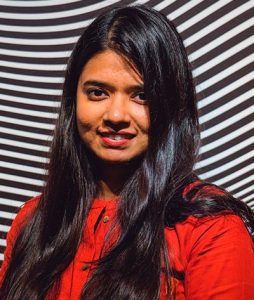December 15, 2020

Omiya Hassan
An electrical and computer engineering student took top honors at the 37th Annual Research & Creative Activities Forum for helping develop a smarter way to diagnose sleep apnea.
Omiya Hassan won first in the engineering and computer technology category of the competition, sponsored by the Graduate Professional Council. Presentations were held virtually last month.
Hassan, a third-year PhD student, showcased her research using machine learning and artificial intelligence to detect sleep apnea.
“In our lab, we’re trying to figure out ways to create different types of low-power machine learning models that can be embedded in digital hardware,” she said. “We want a way to make miniature smart devices that detect medical conditions.”
Currently, sleep apnea is most often diagnosed in a clinic using nocturnal polysomnography. Patients are hooked up to equipment that monitors heart and brain activity, breathing patterns and oxygen levels in the blood.
“It’s very expensive and very disturbing for patients,” Hassan said. “They’re required to stay overnight and don’t go to sleep in a normal way.”
To train artificial intelligence to help diagnose sleep apnea, Hassan collected medical data from an open source library and is currently collaborating with the MU Health Management and Informatics (HMI) department to collect patient data. She wants to use those data to develop algorithms embedded in hardware using minimal servers to ensure a compact design.
Those models will be sent to a fabrication lab in the near future to produce a chip that can be used to develop wearable devices.
Hassan expects a prototype of the chip to be available late next year or early 2022.
Initially, Hassan and her lab mates plan to use their device to diagnose sleep apnea in patients staying in an intensive care unit. The sensor would be added to oxygen tubes already inserted into a nasal cavity.
“We’re trying to eliminate all of those unnecessary, bulky devices,” she said. “People who use this are going to be comfortable.”
Then, the team plans to develop a home-based sleep apnea test in the form of a neck patch that will detect breathing patterns.
Hassan’s work is a continuation of research underway since 2014 and is now under the helm of her advisor, EECS Chair Kamrul Islam. For her part, Hassan introduced machine learning to the project.
Hassan hopes to continue research that helps others as she prepares for a career in academia.
“My goal is to become a humanitarian scientist,” she said. “Whatever I’m going to do, it will be for the betterment of people and underserved communities. Instead of creating expensive, high-end devices, I’m more interested in making products accessible and low cost.”
Shu Yu, who’s earning a master’s in computer science, took second place at the RCAF competition. Hamed Majidifard, who’s pursuing a PhD in civil engineering, and Osasu Osaze, who’s earning a PhD in mechanical and aerospace engineering, tied for third.
Want a graduate program that gives you world-changing research opportunities? Apply today.